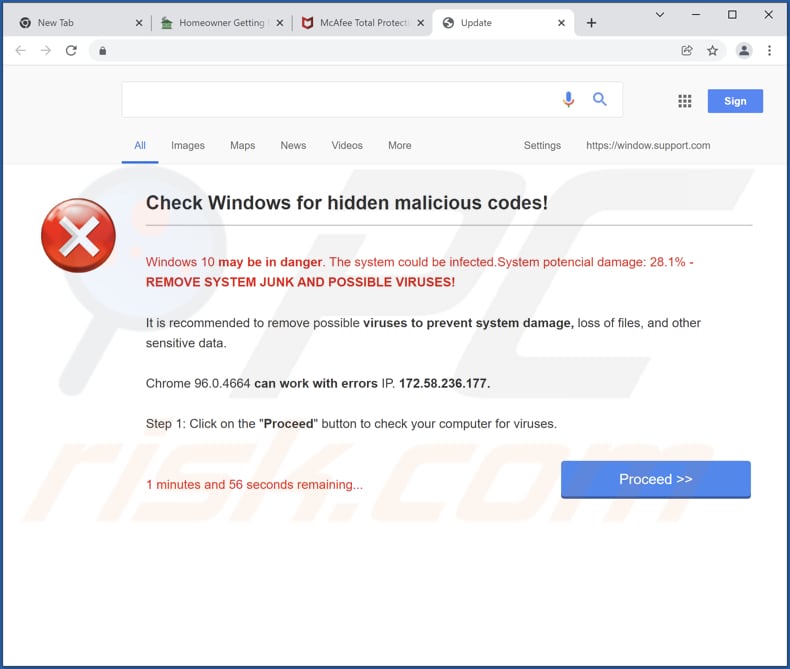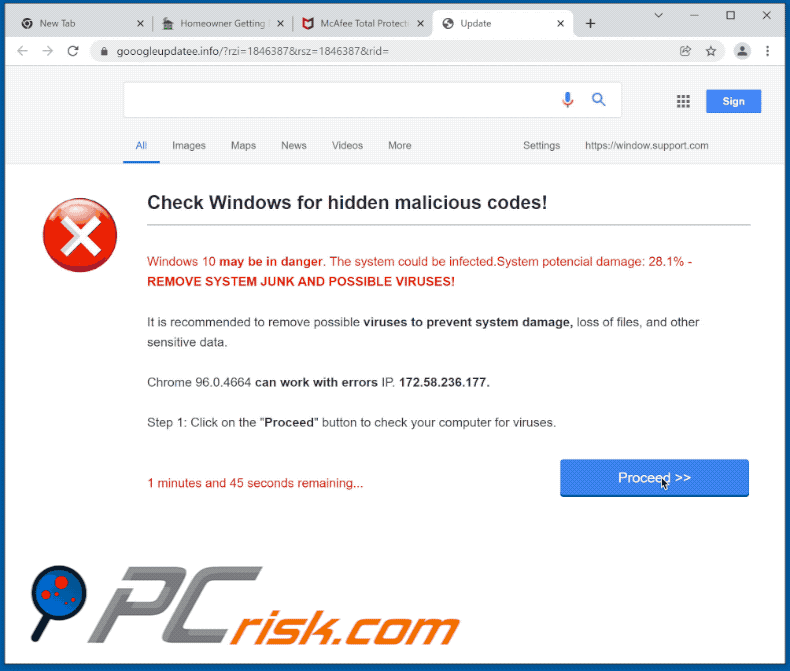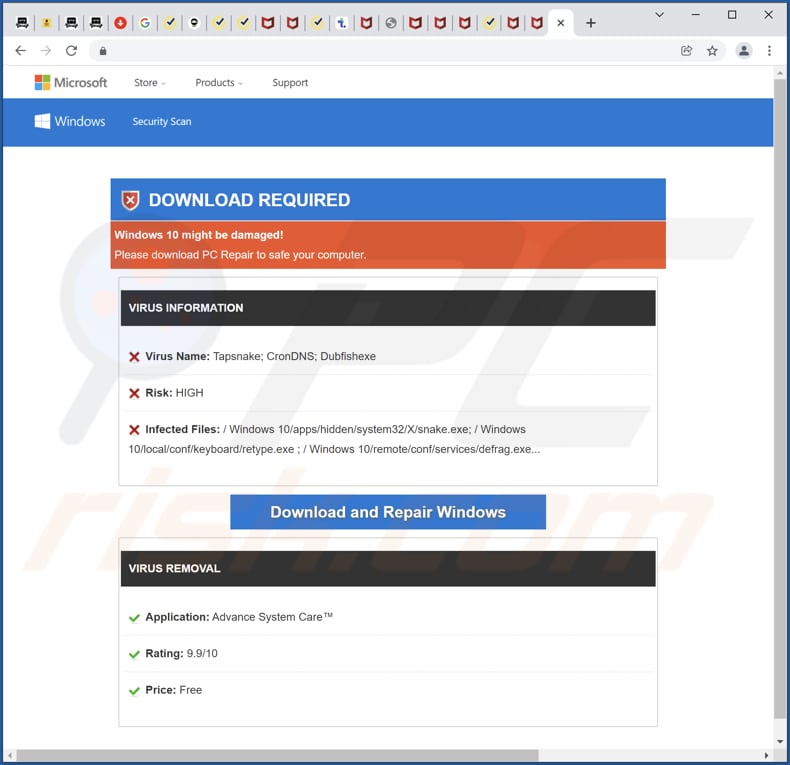How to recognize scams like Windows 10 may be in danger?
Phishing/ScamAlso Known As: Windows 10 may be in danger pop-up
Get free scan and check if your device is infected.
Remove it nowTo use full-featured product, you have to purchase a license for Combo Cleaner. Seven days free trial available. Combo Cleaner is owned and operated by RCS LT, the parent company of PCRisk.com.
What is Windows 10 may be in danger pop-up scam?
It is one of the websites running a fraudulent advertising campaign. This deceptive website uses a scare tactic to promote legitimate antivirus software called Total AV. Usually, these pages are promoted through misleading advertisements, other shady websites, and potentially unwanted apps (PUAs). Users do not visit them intentionally.

Windows 10 may be in danger pop-up scam in detail
This page claims that the operating system might be in danger/could be infected and encourages visitors to scan their computers for system junk and possible infections. After clicking the "Proceed" button, it runs a fake system scan and provides a list of supposedly detected viruses.
The purpose of this page is to trick users into downloading and installing Total AV - legitimate antivirus software that has nothing to do with this fraudulent advertising campaign. It is important to mention that pages of this type can be used to trick users into installing adware, browser hijackers, and other unwanted software.
| Name | Windows 10 may be in danger pop-up |
| Threat Type | Phishing, Scam, Social Engineering, Fraud |
| Fake Claim | A computer is infected with Tapsnake, CronDNS, and Dubfishexe viruses |
| Disguise | Virus notification from Microsoft |
| Related Domain | gooogleupdatee[.]info |
| Detection Names | N/A (VirusTotal) |
| Promoted Program |
Total AV (a legitimate antivirus software) |
| Symptoms | Fake error messages, fake system warnings, pop-up errors, hoax computer scan. |
| Distribution methods | Compromised websites, rogue online pop-up ads, potentially unwanted applications. |
| Damage | Loss of sensitive private information, monetary loss, identity theft, possible malware infections. |
| Malware Removal (Windows) |
To eliminate possible malware infections, scan your computer with legitimate antivirus software. Our security researchers recommend using Combo Cleaner. Download Combo CleanerTo use full-featured product, you have to purchase a license for Combo Cleaner. 7 days free trial available. Combo Cleaner is owned and operated by RCS LT, the parent company of PCRisk.com. |
Websites delivering pop-up scams in general
Pages displaying similar pop-up scams claim that a computer is infected or damaged in some other way. Plenty of them are disguised as official Microsoft or other company pages. A couple of examples of similar scams are "You've Visited Illegal Infected Website", "Firewall Error: #ST43400X", "Avira - Your Pc May Have Been Infected".
How did potentially unwanted applications install on my computer?
Unintentional downloads and installations often are caused while downloading and installing other programs. Users agree to download or install PUAs when they do not check and change "Advanced", "Custom", or other settings or untick checkboxes available in downloaders or installers for programs bundled with PUAs.
In other cases, users download or install unwanted software by clicking on deceptive advertisements designed to execute certain scripts or through fake installers downloaded from shady pages.
How to avoid installation of potentially unwanted applications?
Always use official pages as sources for downloading programs and files, and not other sources. Deselect unwanted applications before downloading or installing programs (it can be achieved using settings available in downloaders or installers used to distribute PUAs). Do not click on advertisements showing up on shady websites.
If your computer is already infected with PUAs, we recommend running a scan with Combo Cleaner Antivirus for Windows to automatically eliminate them.
The appearance of Windows 10 may be in danger pop-up scam (GIF):

Text in the first fake virus notification:
Check Windows for hidden malicious codes!
Windows 10 may be in danger. The system could be infected.System potencial damage: 28.1%
REMOVE SYSTEM JUNK AND POSSIBLE VIRUSES!It is recommended to remove possible viruses to prevent system damage, loss of files, and other
sensitive data.Chrome 96 0 4664 can work with errors IP 172.58 236 177.
Step 1: Click on the "Proceed" button to check your computer for viruses.
1 minutes and 56 seconds remaining...Proceed >>
Screenshot of the fake notification claiming that a computer is infected:

Text in this page:
DOWNLOAD REQUIRED
Windows 10 might be damaged!
Please download PC Repair to safe your computer.VIRUS INFORMATION
Virus Name: Tapsnake; CronDNS; Dubfishexe
Risk: HIGH
Infected Files: / Windows 10/apps/hidden/system32/X/snake.exe; / Windows
10/local/conf/keyboard/retype.exe;/
Windows 10/remote/conf/services/defrag.exe...Download and Repair Windows
Instant automatic malware removal:
Manual threat removal might be a lengthy and complicated process that requires advanced IT skills. Combo Cleaner is a professional automatic malware removal tool that is recommended to get rid of malware. Download it by clicking the button below:
DOWNLOAD Combo CleanerBy downloading any software listed on this website you agree to our Privacy Policy and Terms of Use. To use full-featured product, you have to purchase a license for Combo Cleaner. 7 days free trial available. Combo Cleaner is owned and operated by RCS LT, the parent company of PCRisk.com.
Quick menu:
- What is Windows 10 may be in danger pop-up?
- How to identify a pop-up scam?
- How do pop-up scams work?
- How to remove fake pop-ups?
- How to prevent fake pop-ups?
- What to do if you fell for a pop-up scam?
How to identify a pop-up scam?
Pop-up windows with various fake messages are a common type of lures cybercriminals use. They collect sensitive personal data, trick Internet users into calling fake tech support numbers, subscribe to useless online services, invest in shady cryptocurrency schemes, etc.
While in the majority of cases these pop-ups don't infect users' devices with malware, they can cause direct monetary loss or could result in identity theft.
Cybercriminals strive to create their rogue pop-up windows to look trustworthy, however, scams typically have the following characteristics:
- Spelling mistakes and non-professional images - Closely inspect the information displayed in a pop-up. Spelling mistakes and unprofessional images could be a sign of a scam.
- Sense of urgency - Countdown timer with a couple of minutes on it, asking you to enter your personal information or subscribe to some online service.
- Statements that you won something - If you haven't participated in a lottery, online competition, etc., and you see a pop-up window stating that you won.
- Computer or mobile device scan - A pop-up window that scans your device and informs of detected issues - is undoubtedly a scam; webpages cannot perform such actions.
- Exclusivity - Pop-up windows stating that only you are given secret access to a financial scheme that can quickly make you rich.
Example of a pop-up scam:

How do pop-up scams work?
Cybercriminals and deceptive marketers usually use various advertising networks, search engine poisoning techniques, and shady websites to generate traffic to their pop-ups. Users land on their online lures after clicking on fake download buttons, using a torrent website, or simply clicking on an Internet search engine result.
Based on users' location and device information, they are presented with a scam pop-up. Lures presented in such pop-ups range from get-rich-quick schemes to fake virus scans.
How to remove fake pop-ups?
In most cases, pop-up scams do not infect users' devices with malware. If you encountered a scam pop-up, simply closing it should be enough. In some cases scam, pop-ups may be hard to close; in such cases - close your Internet browser and restart it.
In extremely rare cases, you might need to reset your Internet browser. For this, use our instructions explaining how to reset Internet browser settings.
How to prevent fake pop-ups?
To prevent seeing pop-up scams, you should visit only reputable websites. Torrent, Crack, free online movie streaming, YouTube video download, and other websites of similar reputation commonly redirect Internet users to pop-up scams.
To minimize the risk of encountering pop-up scams, you should keep your Internet browsers up-to-date and use reputable anti-malware application. For this purpose, we recommend Combo Cleaner Antivirus for Windows.
What to do if you fell for a pop-up scam?
This depends on the type of scam that you fell for. Most commonly, pop-up scams try to trick users into sending money, giving away personal information, or giving access to one's device.
- If you sent money to scammers: You should contact your financial institution and explain that you were scammed. If informed promptly, there's a chance to get your money back.
- If you gave away your personal information: You should change your passwords and enable two-factor authentication in all online services that you use. Visit Federal Trade Commission to report identity theft and get personalized recovery steps.
- If you let scammers connect to your device: You should scan your computer with reputable anti-malware (we recommend Combo Cleaner Antivirus for Windows) - cyber criminals could have planted trojans, keyloggers, and other malware, don't use your computer until removing possible threats.
- Help other Internet users: report Internet scams to Federal Trade Commission.
Frequently Asked Questions (FAQ)
What is a pop-up scam?
A pop-up scam is a fake virus, error, or other notification claiming that a computer is infected or damaged in another way.
What is the purpose of a pop-up scam?
Typically, pop-up scams are used to trick unsuspecting users into providing personal information, downloading and installing potentially malicious software, paying for unnecessary services or software. Also, they are used to trick visitors into providing scammers remote access to computers.
Why do I encounter fake pop-ups?
Fake pop-ups are delivered by deceptive websites. Users do not visit such pages on purpose. Usually, these pages get opened by potentially unwanted applications, shady advertisements, websites.
Will Combo Cleaner protect me from pop-up scams?
Combo Cleaner is designed to scan visited websites and detect malicious ones (including websites delivering pop-up scams). Thus, you will be warned immediately, and the access will be restricted.
Share:

Tomas Meskauskas
Expert security researcher, professional malware analyst
I am passionate about computer security and technology. I have an experience of over 10 years working in various companies related to computer technical issue solving and Internet security. I have been working as an author and editor for pcrisk.com since 2010. Follow me on Twitter and LinkedIn to stay informed about the latest online security threats.
PCrisk security portal is brought by a company RCS LT.
Joined forces of security researchers help educate computer users about the latest online security threats. More information about the company RCS LT.
Our malware removal guides are free. However, if you want to support us you can send us a donation.
DonatePCrisk security portal is brought by a company RCS LT.
Joined forces of security researchers help educate computer users about the latest online security threats. More information about the company RCS LT.
Our malware removal guides are free. However, if you want to support us you can send us a donation.
Donate
▼ Show Discussion